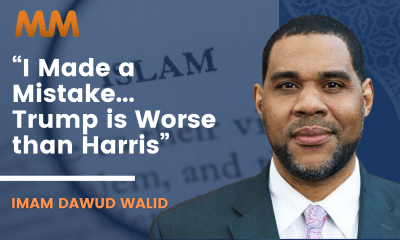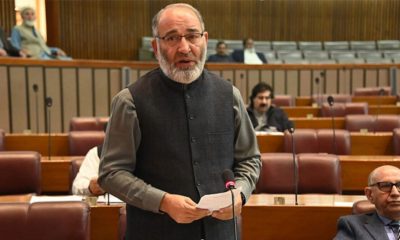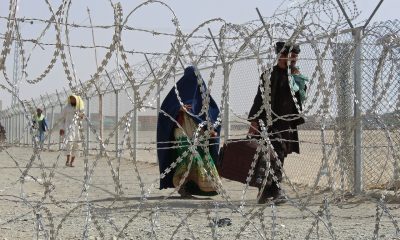[section_title title=Page 5]
(Page 5 of 9)
While the spy agencies had had a fraught relationship since the beginning of the Afghan war, the first major breach came in July 2008, when C.I.A. officers in Islamabad paid a visit to Gen. Ashfaq Parvez Kayani, the Pakistani Army chief, to tell him that President Bush had signed off on a set of secret orders authorizing a new strategy in the drone wars. No longer would the C.I.A. give Pakistan advance warning before launching missiles from Predator or Reaper drones in the tribal areas. From that point on, the C.I.A. officers told Kayani, the C.I.A.’s killing campaign in Pakistan would be a unilateral war.
Keep supporting MuslimMatters for the sake of Allah
Alhamdulillah, we're at over 850 supporters. Help us get to 900 supporters this month. All it takes is a small gift from a reader like you to keep us going, for just $2 / month.
The Prophet (SAW) has taught us the best of deeds are those that done consistently, even if they are small.
Click here to support MuslimMatters with a monthly donation of $2 per month. Set it and collect blessings from Allah (swt) for the khayr you're supporting without thinking about it.
The decision had been made in Washington after months of wrenching debate about the growth of militancy in Pakistan’s tribal areas; a highly classified C.I.A. internal memo, dated May 1, 2007, concluded that Al Qaeda was at its most dangerous since 2001 because of the base of operations that militants had established in the tribal areas. That assessment became the cornerstone of a yearlong discussion about the Pakistan problem. Some experts in the State Department warned that expanding the C.I.A. war in Pakistan would further stoke anti-American anger on the streets and could push the country into chaos. But officials inside the C.I.A.’s Counterterrorism Center argued for escalating the drone campaign without the I.S.I.’s blessing. Since the first C.I.A. drone strike in Pakistan in 2004, only a small number of militants on the C.I.A.’s list of “high-value targets” had been killed by drone strikes, and other potential strikes were scuttled at the last minute because of delays in getting Pakistani approval, or because the targets seemed to have been tipped off and had fled.
So, in July 2008, when the C.I.A.’s director, Michael Hayden, and his deputy, Stephen Kappes, came to the White House to present the agency’s plan to wage a unilateral war in the mountains of Pakistan, it wasn’t a hard sell to a frustrated president. That began the relentless, years-long drone assault on the tribal areas that President Obama continued when he took office. And as the C.I.A.’s relationship with the I.S.I. soured, Langley sent station chiefs out to Islamabad who spent far less time and energy building up good will with Pakistani spies than their predecessors had. From 2008 on, the agency cycled a succession of seasoned case officers through Islamabad, and each left Pakistan more embittered than the last. One of them had to leave the country in haste when his identity was revealed in the Pakistani press. The C.I.A. suspected the leak came from the I.S.I.
Even many of the operations that at first seemed likely to signal a new era of cooperation between the C.I.A. and the I.S.I. ended in recriminations and finger-pointing. In January 2010, a clandestine team of C.I.A. officers and American special-operations troops working in Karachi traced a cellphone to a house in Baldia Town, a slum in the western part of the sprawling city. The C.I.A. did not conduct unilateral operations inside large Pakistani cities, so the Americans notified the I.S.I. about the intelligence. Pakistani troops and policemen launched a surprise raid on the house.
Although the C.I.A. didn’t know in advance, hiding inside the house was Mullah Abdul Ghani Baradar, a man considered to be the Afghan Taliban’s military commander and the second in command to Mullah Muhammad Omar, the leader of the Taliban. Only after suspects in the house were arrested and questioned did the C.I.A. learn that Baradar was among the detainees. The I.S.I. took him to a detention facility in an industrial section of Islamabad and refused the C.I.A. access to him. “At that point, things got really complicated,” one former C.I.A. officer said.
Was the entire episode a setup? Rumors had circulated inside Pakistan that Baradar wanted to cut a deal with the Americans and bring the Taliban to the negotiating table in Afghanistan. Had the I.S.I. somehow engineered the entire arrest, feeding intelligence to the C.I.A. so that Baradar could be taken off the street and the nascent peace talks spoiled? Had the I.S.I. played the C.I.A.? Months later, senior C.I.A. officials at Langley still couldn’t answer those questions. Today, more than three years later, Mullah Baradar remains in Pakistani custody.


 #Current Affairs4 weeks ago
#Current Affairs4 weeks ago
 #Current Affairs1 month ago
#Current Affairs1 month ago
 #Culture1 month ago
#Culture1 month ago
 #Islam3 weeks ago
#Islam3 weeks ago















Hassan
April 15, 2013 at 12:38 PM
Hmm, if I remember correctly, the two killed by Davis were ISI people trying to see what Davis is upto. The article did not mention that
Gibran
April 15, 2013 at 9:04 PM
Assalamualaikum wa rahmatullahi wa barakatuh
How do you know such a thing?
Hassan
April 16, 2013 at 1:42 PM
That is what I heard, I can go and check pakistani newspaper. But what I heard was that ISI agents were seeing what Davis is upto and he realized it and then killed them
Gibran
April 16, 2013 at 4:30 PM
Assalamualaikum wa rahmatullahi wa barakatuh
It my be a conspiracy theory.
Hassan
April 16, 2013 at 11:43 PM
See me response below
Mansoor Ansari
April 16, 2013 at 12:09 AM
No they were not, they were small time crooks.
Hassan
April 16, 2013 at 11:43 PM
http://www.time.com/time/printout/0,8816,2047149,00.html
“Equally misleading, say Pakistani officials, is the claim in Pakistani media that Davis’ victims had been “ordinary men”, or even as “robbers,” as the State Department has suggested. “They were from the ISI,” says a government official, referring to Pakistan’s military intelligence agency. It isn’t clear, the official says, whether they were full paid-up agents or local informants.”
and
“The loss of two men linked with the ISI has injured the Pakistani military’s pride, officials say, and comes amid rising tensions with Washington”
This is definitely the standard position of Pakistani government. So I am surprised this was not mentioned. (even if it was wrong claim)
Gibran
April 16, 2013 at 11:47 PM
Assalamualaikum wa rahmatullahi wa barakatuh
What reason would they have to say those two men are ISI agents? In all likelihood they weren’t. Allahu a’lam, the first cases to be judged on yawm al Qiyamah are cases of bloodshed.
Aly Balagamwala | DiscoMaulvi
April 17, 2013 at 12:12 AM
They were low-level informants. If they had really been higher-level ISI agents there would have been no way Davis could have walked out. And the relations would have soured much more.
Hyde
April 29, 2013 at 10:42 PM
What was the purpose of this article to appear on MM ? If it was to garner some sort of sympathy for the state of Pakistan, I certainly don’t think it achieved its purpose. The real problem with Pakistan was 1947 and besides turning civil courts into shariah courts shows the contempt they have for authentic Islamic practices. Islam to be used as a crutch; you can use when it best serves and dispose of it when you don’t need it. I wonder if it was the generalissimo’s family that was involved, would he be so quick to get “blood money” ? (Does the Fauj give blood money to the people it takes “care off” in Baluchistan ?) The elite all over the muslim world are the same.
Angry Muslimah
September 12, 2013 at 11:29 AM
what about the guy who was run over? what happend to the driver? nothing right. thats normal, look at fallujah and haditha and all the countless times they have killed muslims on purpose they dont bother to reprimand their army. bradley manning told of how civilians were being killed regularly, but his co said no problem!